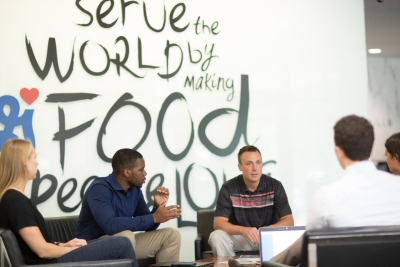Courageous conversations—and actions

The following is excerpted from Issue 28 of The Corporate Citizen.
The current economic climate requires companies to attract and retain the best talent in order to compete. To do so, firms are offering benefits that go beyond salary and basic health insurance to improve employee wellness and lifestyles more holistically. Here we explore how one company, General Mills, has implemented corporate citizenship programs that have successfully contributed to attracting and retaining top talent.
General Mills, a Minnesota-based food company employing 38,000 people in more than 100 countries, prioritizes the well-being and full engagement of those employees. From expanding employee benefits to facilitating dialogue on difficult conversations in the workplace, the company has proven its commitment to supporting employees’ physical, social, and emotional well-being.
The company recognizes that to attract and retain the best employees, it must offer competitive benefits and fulfilling employee engagement opportunities. “General Mills has been making food people love for more than 150 years, and our employees have always been our secret ingredient,” said Jacqueline Williams-Roll, chief human resources officer at General Mills. “We want to keep innovating in how we meet their evolving needs.”
With this mindset, General Mills expanded parental leave and paid time off for both its salaried and nonunion production workers as of January 2019. This includes offering 18 to 20 weeks paid time off for new moms, and 12 weeks paid time off for new dads, partners, and adoptive parents. General Mills also introduced caregiver leave, and expanded its bereavement and short-term disability plans. These enhanced policies build on the company’s longstanding culture of workplace flexibility, where salaried employees are welcome to work from home when necessary for their families.
“We spent a lot of time talking with employees at different life stages and asking questions about their pain points and what contributes to feeling torn between work and home,” said Williams-Roll. “Out of those discussions, we developed a strategy to focus on the moments when employees really need support the most.”
While employee benefits like paid leave are traditionally owned by HR, corporate citizenship professionals can still play a key role in promoting employee engagement best practices as a partner and supporter. Research shows that corporate citizenship professionals tend to underutilize HR departments, and such a partnership can accelerate planning, implementing, monitoring, and institutionalizing corporate citizenship initiatives.[1]
General Mills further supports attraction and retention efforts with plenty of opportunities for employee engagement. The company’s Courageous Conversations initiative, for example, invites employees to engage in open and candid conversations about difficult, present issues. These forums are an opportunity for leaders and employees to come together on subjects like the #MeToo movement, unconscious bias, and mental health in the workplace—often involving employee resource groups with experience on the issues. “We did one on ‘take a knee,’” said Williams-Roll, referring to the NFL’s anthem protests. “We had our Veterans Network and our Black Champions Network actually co-host that session.”
Including and engaging employees in conversations about their greater communities also encourages them to get involved in corporate citizenship initiatives. In 2017, 83 percent of General Mills employees worldwide dedicated their time to volunteering in their communities. The company organizes a variety of volunteering opportunities, empowering employees to apply their skills, expertise, and passion to help their communities. This includes professional development opportunities in the form of the Good Works skills-based volunteering program, in which employees leverage their skills to help nonprofit organizations with marketing challenges.
General Mills recognizes that employee engagement through volunteerism is valuable to current and potential employees alike. “People are coming to our company expecting that they are going to be holistically and meaningfully engaged—that they’re going to be able to use their skills not just to advance the business, but also to serve others and make a difference in our communities,” says Minn Wang, senior manager of global employee engagement for the General Mills Foundation. “This is often a reason employees choose to build their careers here.”
General Mills differentiates itself as a competitive employer through its generous benefits, prioritizing employees’ work-life balance, and its commitment to engaging employees culturally and through volunteer efforts.
[1]Khare, A., and Lam, H. (2010). HR’s Crucial Role for Successful CSR. Journal of International Business Ethics (3).
